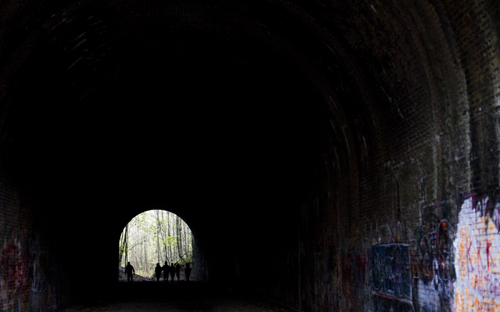 July 20, 1969: I’m running in a wide circle at the far end of the cul-de-sac, around and around until I settle in the dust under a thorny bush, but then my name floats into the game, calling me back as dusk descends on the neighborhood. Other names unfurl like ribbons, doors opening and closing—Bobby, Brenda, Laura!—and none of us kids even says goodbye, we just disperse, our small band so easily dissolved. I leave my perfect hiding place—knees scratched, my hair smelling of sap—to go back inside, where it’s too hot and smells of stuffed cabbage, the television on to the evening news. Walter Cronkite, his bass voice so reassuring, as he tells us that man has gone on an adventure to escape his familiar planet. Father, mother, brothers—we’re all angled toward the television because something momentous is about to happen: the first man to walk on the moon.
July 20, 1969: I’m running in a wide circle at the far end of the cul-de-sac, around and around until I settle in the dust under a thorny bush, but then my name floats into the game, calling me back as dusk descends on the neighborhood. Other names unfurl like ribbons, doors opening and closing—Bobby, Brenda, Laura!—and none of us kids even says goodbye, we just disperse, our small band so easily dissolved. I leave my perfect hiding place—knees scratched, my hair smelling of sap—to go back inside, where it’s too hot and smells of stuffed cabbage, the television on to the evening news. Walter Cronkite, his bass voice so reassuring, as he tells us that man has gone on an adventure to escape his familiar planet. Father, mother, brothers—we’re all angled toward the television because something momentous is about to happen: the first man to walk on the moon.
Somehow we’re going to see it. We’ll see Armstrong in his space suit emerge from the metal door; we’ll see it as if looking through a scratched and dirty window, with blips and bleeps and static and a shimmering gray overlaying everything because he’s out there now, a lone man in a different atmosphere altogether, moving backward down the ladder one slow step at a time. And then, right before his foot touches down in the dust, the words that will become an emblem: one small step for man, one giant leap for mankind. He does it, takes a little hop down onto that alien surface, the only man in the universe.
Everyone is sitting quiet, watching, forks in midair—I can see the profile of my father’s jaw, my mother’s small shoulders—and just at that moment, I decide to clank my fork on the edge of my plate, to make a loud noise that will penetrate the vast silence in which this man now moves. Everyone turns toward me: father, mother, brothers, (I can imagine even Walter Cronkite, taking off his big black glasses the way he does when he’s about to cry), angry, annoyed, and my father says well, thank you very much, and I know I’ve ruined it, this historic moment.
I don’t know why I did it: maybe I just feel vastly lonely, want to make my presence known, or maybe I thought it would be funny, or maybe I was kind of applauding, the way the men in Houston must have been jumping up and down, shaking hands, mission accomplished after so many years of study and work and planning, they had done it, they had put a man on the moon! My faux-pas just hangs in the air, the clank of the fork still hurting my ears. They turn back to the television, the set of their bodies so solidly against me, and I guess I don’t really understand why it would be so great—to be a man on the moon, exiled, in orbit so far from home.
—
Brenda Miller is the author of Listening Against the Stone (Skinner House Books, 2011), Blessing of the Animals (EWU Press, 2009), Season of the Body (Sarabande Books, 2002), and co-author of Tell it Slant: Writing and Shaping Creative Nonfiction (McGraw-Hill, 2003). Her work has received six Pushcart Prizes and has been published in numerous journals. She is a Professor of English at Western Washington University and serves as Editor-in-Chief of the Bellingham Review. Her book The Pen and The Bell: Mindful Writing in a Busy World, co-authored with Holly Hughes, is forthcoming in 2012 from Skinner House Books.
Photo by Annie Agnone
